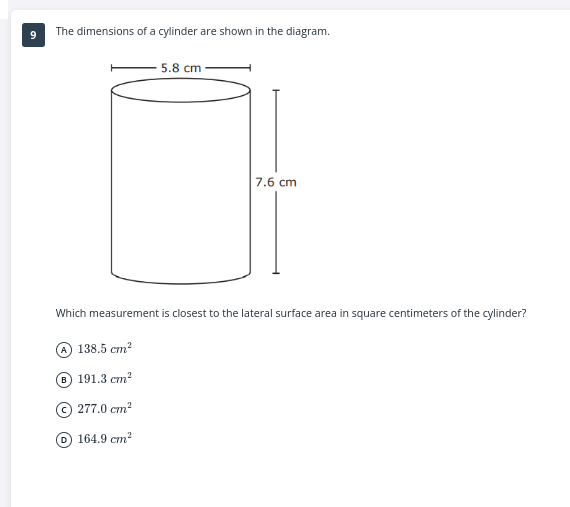Which measurement is closest to the lateral surface area in square centimeters of the cylinder?

Understand the Problem
The question is asking for the lateral surface area of a cylinder using the given dimensions (height and diameter). To solve this, we will use the formula for the lateral surface area of a cylinder, which is 2πrh, where r is the radius and h is the height.
Answer
$138.5 \, \text{cm}^2$
Answer for screen readers
$138.5 , \text{cm}^2$
Steps to Solve
- Identify the dimensions of the cylinder
The height ($h$) is given as $7.6 , \text{cm}$ and the diameter ($d$) is given as $5.8 , \text{cm}$.
- Calculate the radius of the cylinder
The radius ($r$) can be calculated by dividing the diameter by $2$:
$$ r = \frac{d}{2} = \frac{5.8 , \text{cm}}{2} = 2.9 , \text{cm} $$
- Use the formula for the lateral surface area of a cylinder
The formula for the lateral surface area ($A$) is:
$$ A = 2 \pi r h $$
Substituting the known values for $r$ and $h$:
$$ A = 2 \pi (2.9 , \text{cm})(7.6 , \text{cm}) $$
- Calculate the lateral surface area
Now we can calculate the lateral surface area:
- First, calculate the product of the radius and the height:
$$ 2.9 \times 7.6 = 22.04 , \text{cm}^2 $$
- Next, multiply by $2\pi$:
$$ A \approx 2 \times 3.14 \times 22.04 , \text{cm}^2 $$ $$ A \approx 138.56 , \text{cm}^2 $$
- Round the result
The lateral surface area is approximately $138.56 , \text{cm}^2$. Rounding this gives us $138.5 , \text{cm}^2$.
$138.5 , \text{cm}^2$
More Information
The lateral surface area of a cylinder represents the area around the side of the cylinder, excluding the top and bottom faces. Understanding how to apply the formula for the lateral surface area is crucial when dealing with cylindrical shapes in geometry.
Tips
- Not converting the diameter to radius correctly.
- Forgetting to multiply by $2\pi$ in the lateral surface area formula.
- Miscalculating the product of the radius and height.
AI-generated content may contain errors. Please verify critical information